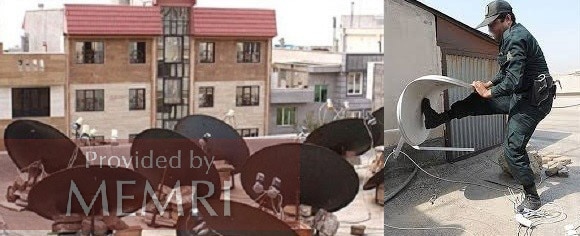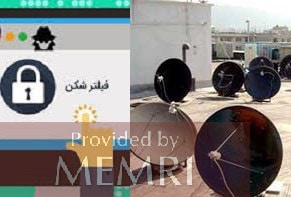Against the backdrop of the last few months' ongoing public protests in Iran against the leaders of the regime of the Islamic Revolution over its economic and political policies, the regime has acted to increase its control of the public and stepped up its attempts to prevent Western cultural influence that, it says, endangers the values of the revolution. The Iranian regime sees the Internet as a Western agent that undermines the regime, and thus both restricts it and seeks oversight and control of what users can access by means of it.[1]
This paper is the first in a series on public criticism of the regime in Iran, in light of its attempts to impose strict codes of social and cultural conduct, in the spirit of the Islamic revolution, on the public, particularly on the younger generation, and in light of the regime's policy of stringent enforcement and harsh punishments for offenders. This first installment will focus on criticism of the law that bans using VPNs to access social media.
On July 15, 2018, Abdolsamad Khoramabadi, Iran's deputy chief attorney general for Internet affairs, said that, according to up-to-date figures from July 2018, about 30 million Iranians use VPNs to access Hotgram and Telegram Gold in order to circumvent the regime's blocking of these services. He said that the use of VPNs violates the rules of the Supreme Cyberspace Council and that the regime will soon disable them.[2]
On July 8, 2018, the Asriran.com website, which is associated with pragmatic circles in Iran, published an article criticizing the regime's policy of blocking websites and social media, particularly the encrypted messaging app Telegram, which is the most popular communications app in Iran. It focused on the new law banning the use of VPNs – which allow users to circumvent blocking and conceal users' identity – to access social media, stressing that a law that is contrary to the accepted norms in society will ultimately be broken by most of the public. As a case in point, it gives the example of the regime's ban on satellite dishes, that it says is violated by 70% of the public.
The following is a translation of the main points of the article:
Iranian Website: If They Want To Enforce The Laws Banning Satellite Dishes And VPNs, They Will Have To Arrest And Prosecute Millions Of Iranians; This Is Neither Reasonable
"Not long ago, a legal element in an Iranian province outlawed the use of VPNs, and said that anyone using Telegram via a VPN would be punished. Majlis member for Tehran Mahmoud Sadeqi, who, by the way, is also a jurist, pointed out that the law includes no specific obstacle to the use of a VPN.
"The point of this article is not to decide between these two opinions – whether using a VPN is an offense or not – but to say something more important... They say that a law is like a garment. A man's garment should not be so tight as to hurt him, prevent him from walking, interfere with his comfort, or ultimately rip. The garment also should not be so loose that it cannot be worn or that it falls off.
"Just as a garment is fitted to the body's measurements and dimensions, so too must a law be passed and implemented according to society's conduct and norms. Accordingly, if you see that most of society acts according to a particular norm but the law prohibits [this behavior], you will know that the legislator has 'tailored' the garment without consideration for society's measurements. Such a law will inflict suffering on the people, and will ultimately be broken.
"One salient example of this is the law banning satellite dishes. Today, everywhere in the world, and also in Iran, these dishes are widely used to receive thousands of television channels. In Iran, some 70% of the public uses them.
"Obviously, it is untenable when there is such a huge chasm between the law as it is written and the reality of society: On the one hand, it harasses the people (police occasionally collect satellite dishes, in either an orderly or disorderly manner); on the other hand, the law is being broken (the public is using satellite dishes)... Even though it has been nearly 25 years since this law was passed, a look at the roofs of the homes of millions of Iranians shows the extent to which this law, which does not take into account the [needs of] society, is actually being implemented!

Removal of illegal satellite dishes (Source: Asriran.com, July 8, 2018)
"The law defines the use, transfer, possession, repair, and installation of satellite [dishes] as an offense, and sets fines for violators – so that right now, as you are reading about this, you are either breaking the law [yourself] or living among 50 to 60 million offenders!
"The story of the use of a VPN is the same. When websites and social media accepted by society are blocked for any reason, and the use of VPNs is blocked and banned, clearly the garment is too tight for society, and will only rip as the number of 'transgressors' in society keeps increasing!
"If they want to enforce these two laws (banning satellite dishes and banning VPNs), they will have to arrest and prosecute tens of millions of Iranians. This is neither feasible nor reasonable.

"Cancel the filtering" – i.e. stop the blocking (Source: Asriran.com, July 8, 2018)
"Therefore, there is an urgent need in Iran today for amending the law according to the accepted needs and norms of society. As long as legislators pass laws between the four walls of the Majlis while trampling society, and require the executive and judiciary branches to implement the law, the garment of the law will not fit society. The prominent outcome will be the desecration of the principle of law, and the normalization of breaking the law."
[1] See MEMRI Inquiry and Analysis No. 1370, The Popular Uprising In Iran 2017-2018: Lessons Learned By The Regime, January 17, 2018.
[2] Tasnim (Iran), July 15, 2018.
[3] Asriran.com, July 8, 2018.





